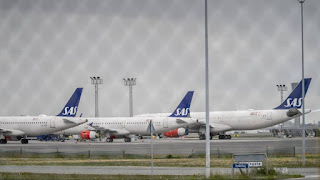A matter of time
Bang Petersen has studied Danes' behavior, opinions and feelings during the coronavirus crisis and believes the authorities should prepare people for wearing masks (DK). “There is now a relatively broad consensus in other places that masks work,” says Bang Petersen. “I would therefore expect that there would be strong political pressure to recommend masks as a first layer of protection if there is a second wave.”
 |
| Masks are required on roller coasters. Photo: Mads Claus Rasmussen © Scanpix. |
The EU has recently recommended that people wear masks on trains and in railway stations. Denmark’s Red-Green Party proposed that masks be required on public transport (DK). “There is a group of citizens who are actually excluded from using public transportation [because of the risk of infection],” says Peter Hvelplund, the party’s health spokesperson, “and therefore the Health Minister and Minister of Transport must find a solution.”
Not a second wave
Most of the parties are in favor of a recommendation to wear masks but do not believe it is necessary to make them mandatory while the infection rate remains low. “Masks are an option, but there is of course a tradeoff with the inconvenience of wearing them all the time,” says Stinus Lindgreen of the Social Liberal Party.
Søren Brostrøm, the head of the Health Authority, says that at present there is no value in requiring masks (DK) in order to reduce infections. “We are following the figures closely across the country and locally in order to see whether we should use the tools we have in our toolbox,” says Brostrøm. “We don’t have anything against masks in principle. . . . We are ready if the situation requires it.” But he describes the latest rise in cases as a “flare-up” rather than the beginning of a second wave.
Use the app
More than 820,000 people have now downloaded the contact-tracing app, Smittestop. But only 207 have registered having the infection. That is far from enough (DK), says Thomas Benfield, Professor of Infectious Disease Medicine at Hvidovre Hospital. “We should register four or five times as many before it becomes optimal.” The app did not become available until after the number of cases had already been reduced greatly. The delay in the rollout occurred because of concerns about privacy.












